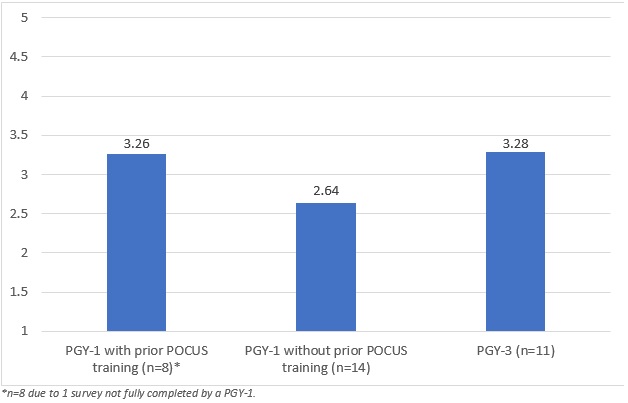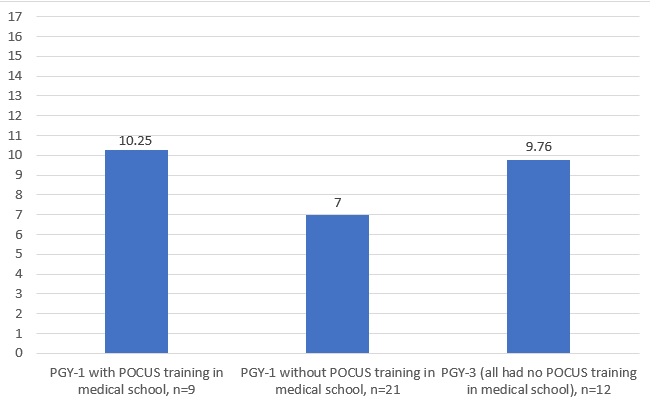Background: The role of point-of-care-ultrasound (POCUS) as a useful bedside tool for hospitalists is growing. Few studies examined residents’ attitude towards POCUS or compared POCUS image interpretation skills between residents with and without POCUS training in medical school.
Methods: We distributed a 24-question anonymous survey to all our residents. Respondents self-reported their attitude towards POCUS and their confidence in recognizing common POCUS images (using a 1-5 Likert scale). We also conducted an anonymous test to assess residents’ skills in interpreting common lung and cardiovascular POCUS videos. Using t-tests, we compared mean confidence levels and test scores between residents with and without POCUS training in medical school.
Results: 52 residents responded to the survey (response rate 68%) and 59 took the POCUS test (77%). Most residents (90%) reported being extremely or mostly interested in learning POCUS skills in residency. Residents with prior POCUS training (n=13) were either PGY-1 (9) or PGY-2 (4); no PGY-3 resident had prior training. Most residents (83%) thought that POCUS could be extremely useful in the inpatient setting compared to 29% for the outpatient setting. PGY-1 residents with prior training had higher mean confidence level than PGY-1 without prior training, but the difference was not statistically significant (3.26 vs 2.64; p=0.08. Figure 1). Their mean was close to that of PGY-3 residents. PGY-1 residents with prior training scored significantly higher than PGY-1 residents without prior training (10.25 vs 7; p=0.01. Figure 2). Residents felt most confident in interpreting inferior vena cava images (mean 3.7), which also had the highest score in the image interpretation test (correct response 88%).
Conclusions: Our residents are very interested in POCUS training in residency, especially during the inpatient rotation. Academic hospitalists are likely to encounter a growing number of interns coming into residency with some POCUS training in medical school. As expected, this subset of interns performed significantly better than their peers without prior training in image interpretation and had higher level of confidence in their POCUS skills. Both their confidence and test performance were comparable to PGY-3 residents. This is encouraging to medical schools who provide POCUS training to their students. Internal medicine residency programs interested in adopting POCUS curriculum can start with similar data gathering to better understand their residents’ baseline knowledge and attitude towards POCUS skills and training.


